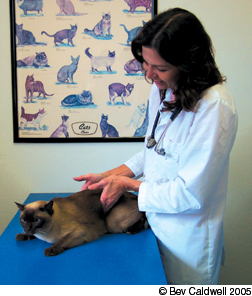Information circles the globe almost instantaneously, but when you must communicate face-to-face with your cats veterinarian, the exchange may slow to a standstill. Some people are intimidated by the veterinarian, says Drew Weigner, DVM, whose practice is The Cat Doctor in Atlanta, Georgia. The veterinarians use of technical terms, the effort to fit everything into a short exam period, not knowing what to ask or dealing with a feline emergency – all can have an adverse effect on how well you both communicate.

252
A Two-Way Street
Your veterinarian plays a vital role, but your cats health and well-being depend primarily on you as his caregiver. The more you understand about what is wrong with your cat, and what treatment he needs, the better able you will be to care for him. Its important that clients know what is going on with their cats, says Dr. Weigner, who is board-certified by the American Board of Veterinary Practitioners. Were careful to explain things in great detail.
One of the obstacles for veterinarians is the caregiver who does not relate enough information. We tell people were here to help, says Dr. Weigner. But sometimes, trying to get information out of a client is like pulling teeth.
When you take your cat to the veterinarian, bring more than just the cat. Make a list of the questions you want to ask. Allow space to jot down the answers as your veterinarian gives them to you. We encourage a list of questions, says Dr. Weigner.Its a very efficient way of communicating in a short period of time.
If you keep a journal of your cats signs, bring that along so you wont forget anything that can help the veterinarian diagnose the problem, especially if your cat suffers from a chronic condition. Tell us everything – even if it doesnt seem important, says Dr. Weigner. Sometimes a client will casually mention things that turn out to be vitally important, especially with chronic cases. If you have old records from a different veterinarian, bring those. They help us determine a trend, says Dr. Weigner.
Although you want to give your veterinarian as much information as is relevant, try to be respectful of his time. Some people bring journals that go back too far or give too much information, says Dr. Weigner. But wed still rather have too much information than not enough.
When your veterinarian explains something, pay attention and write it down.
Sometimes, clients dont listen, says Dr. Weigner. Theyre thinking ahead to the next question and, as a result, ask the same thing over and over. Having a person who is not the primary caretaker accompany the cat to the veterinarian can also hamper information exchange. The other person may not have a clue about the cats signs or behavior, says Dr. Weigner.
A problem for some cat owners is trying to cram everything into a 15-minute exam. This may be enough time to explain the condition to a veterinarian, but not enough to have the veterinarian explain the diagnosis or the treatment. Fifteen minutes may be fine for a kitten getting his third vaccination, but not for a sick cat, says Dr. Weigner. Our appointments are at least 30 minutes, and we often hear from clients that theyre thankful we took our time.
The Basic Questions to Ask
At a minimum, you should ask some basic questions of your veterinarian. Clients should ask whats wrong, how the problem is diagnosed, how it will be treated, what outcome to expect, the prognosis and if the cat is going to get better, says Dr. Weigner.
If you have physical or emotional limitations that might affect your ability to carry out your cats treatment regimen, tell your veterinarian. Not everyone is comfortable giving tablets, for example, and an elderly person might have trouble opening a bottle of pills.
If the client cant do what is asked, the cat wont get better, says Dr. Weigner.
Administering liquid medication is easier than pilling some cats. If you know that your cat has a preference, tell your veterinarian. A cat that goes outside might not get medicine three times a day, so something that can be given once or twice might be a better option, says Dr. Weigner. And, expect the veterinarian to follow up to see if your cat is improving. If not, say so.
Emergencies
Dealing with an emergency can disrupt communication altogether. Remember: Your veterinarian is there to help, so take a deep breath and try to be calm and clear. Getting into the habit of observing your cat under normal circumstances and relating your cats condition to your veterinarian will help you do the same in an emergency.



